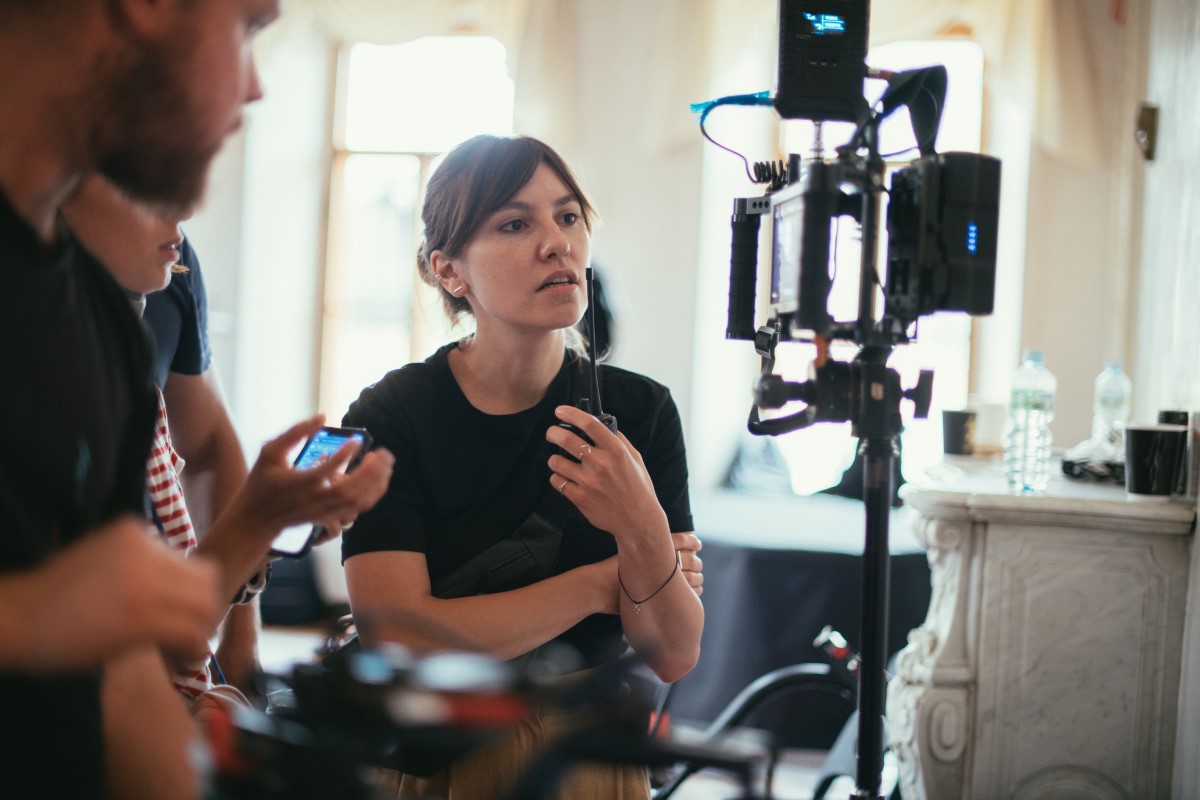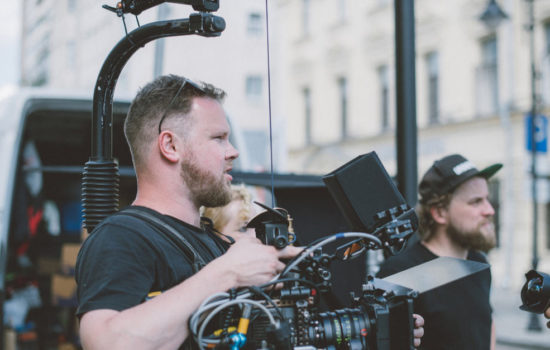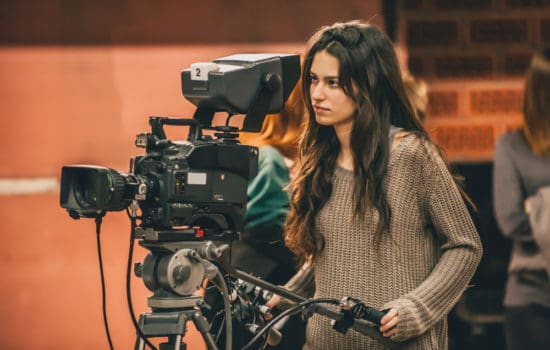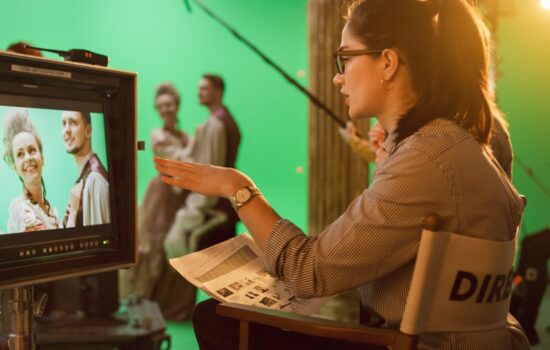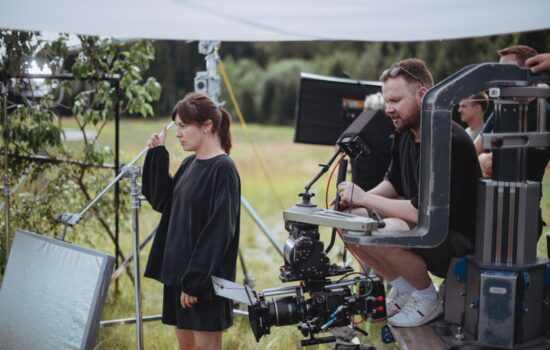The specifics of what a Filmmaker does depends entirely on how they contribute to the making of a movie.
A Director offers support and instruction to their Actors, drives the creative vision of the film, and often oversees most of the filmmaking stages from pre-production through post.
A Producer typically secures the financial backing for a film, manages the hiring of the primary cast and crew, and sees the movies through its completion and distribution.
Others who take part in the making of a movie – Screenwriters, Cinematographers, Editors, and more – have their own unique responsibilities that help towards the creation of a film.
But despite the distinct differences between these roles, all Filmmakers who become successful at their craft share several of the same traits. So if you want to know what a Filmmaker does to ensure a long and thriving career, read on!
The film industry is a competitive field. So many people want to be part of it, but the percentage of gigs that pay well—or pay at all—to sustain oneself financially is low. All to say, to be successful in filmmaking, a Filmmaker must become the best at what they do.
What do you call someone who makes movies?
That might mean starting off your career with film school. While virtually no specialty has degree requirements to work in the field, getting an education in film can provide a solid foundation for your professional life.1
In film school, students can learn their respective crafts in a supportive environment, get firsthand experience through internships and student films, and build their professional network through their film school colleagues and peers.2
Of course a great Director or great Producer knows how to do their job well. But part of mastering their craft also depends on their ability to create industry connections.
Film school is a fantastic place to start making those connections, but it’s a skill that is required of every Filmmaker throughout the course of their careers. Even those who have worked in film for years or decades.
It’s hard to overestimate just how important this part of working in the industry is. Professional relationships built upon mutual trust and respect can make or break your career. Consider some of the most famous cinematic collaborations… That of Steven Spielberg and John Williams or the Coen brothers and Roger Deakins.3
Even if you pride yourself on your excellent directing or producing skills, be sure to invest in others as well to truly become the best Director, Producer, or other type of Filmmaker that you can be.
How do you become a Filmmaker?
Anna Keizer (CareersInFilm)
There’s a relatively low threshold of entry for becoming a Filmmaker. If you have a smart phone with video recording capabilities, you’re well on your way to making a movie. However, to become a Filmmaker who can sustain themselves financially through their work is an entirely different conversation. The film industry is an incredibly competitive one with higher supply than demand in terms of people wanting to work in it. For that reason, it can be challenging to get enough work that pays an adequate wage as a Filmmaker.
No one in film can just earn a degree or work on a few films and consider their cinematic education finished. Especially for those who work in technical specialties like cinematography or editing where rapid changes to equipment and software are common, it’s important to always be learning as a Filmmaker.4
But even for Directors and Producers whose may not be as affected by technical advancements, there’s always much to learn. For Producers, that might mean educating yourself on new distribution models such as streaming and video on demand. For Directors, it might mean embracing the relatively new presence of Intimacy Coordinators to better ensure that their Actors are as comfortable as possible on set.5
Cinema has come a long way since its inception little more than 100 years ago, which means that Filmmakers must stay ahead of the proverbial curve to guarantee—as much as anyone can guarantee anything in this industry—their place in it.
Because Filmmaker is a general term, it can refer to many people. That being said, it’s often used to refer to mostly Directors and Producers, as they’re typically the individuals who lead the making of a movie.
Given just how intricate filmmaking can be with hundreds if not thousands of people working on a single feature, Filmmakers must become leaders on a production. Because if they’re not driving the making of the movie, it’s all too easy for it to fall apart.
Let’s start with the Producers on a movie. Unless it’s a very modest project, there will likely be multiple Producers attached to it.6 Producers lead the charge when it comes to finding funding for their film, hiring the people to make it, and making sure that movie sees the light of day via distribution.
They are also the individuals everyone else will come to if there’s a problem. And even on a modest project, there will always be issues to address. But as a Producer, it’s your job to figure it out. Is a cast member sick? Has a piece of equipment failed? Did a location fall through?
Producers are the ultimate troubleshooters and must be comfortable being that person everyone else turns to when something goes wrong.
Who is considered a Filmmaker?
Anna Keizer (CareersInFilm)
The term Filmmaker is a general one, and as it implies, it refers to someone who contributes to the creation of a movie. That being said, it often is used only when speaking of a Director or Producer, the individuals who generally are most responsible for the making of a film.
If Producers can be thought of as logistical troubleshooters, Directors are the creative ones. More often than not, it’s the Director who is making the major creative decisions for a movie. What they want it to be tonally, visually, thematically, and so on. They typically will have major input, if not final say, in terms of who else they are closely collaborating with. That means the Cinematographer, Editor, and Actors.
Like the Producers, the Director is looked to as a leader on set. While some issues might get redirected to individuals such as the 1st AD or Cinematographer, much of what a Director does is making creative decisions and addressing any hiccups related to them during production.
The Cinematographer may defer to the Director in terms of how the film will be shot, but they are still the leader of their department. The camera department might be comprised of dozens if not more individuals, and it’s the Cinematographers job to make sure everyone is working towards the same goal.
Though some Directors want to be significantly involved regarding how the film will be shot and what the footage will look like, the Cinematographer might just be given creative control in this regard. Again, this requires the DP to lead in terms of the literal vision of the film and all the elements that relate to it.
Much like the Cinematographer heads up the camera department, the Film Editor is considered a leader in the editing room.7 The Director again may work closely with this individual, but it’s often the Film Editor who takes charge in terms of deciding how the film will be cut together, including which takes to use, how long to use them, and in what order the shots will be put together.
The Editor will also be involved regarding how the other post elements8, including the score and sound design, come together in the completed film.
A major facet of filmmaking is the ability to work with other creatives and technicians. We’ve mentioned several times already how important it is for Filmmakers to connect with other in the industry and build a network of contacts. But that’s only the bare minimum when it comes to working well with others.
Once you get that job, you are immediately put into a position where you must constantly balance your opinions and desires against those with whom you are collaborating. Some vital relationships like that between Director and Actor or Director and Cinematographer are well known in the industry. But regardless of your specialty, we can guarantee that you will be frequently needing to work respectfully and productively with others.
Even if you are the Director or Producer on a film, it’s central to the film’s success that you understand how to work well with others despite your position as the leader or person with the final say on set.
What a Filmmaker does is… a lot. They must constantly make sure that their skillsets and knowledge evolve and stay current with the needs of the industry. They must be comfortable in the position of being a leader who must make hundreds of decisions every day and find solutions to the inevitable issues that arise during the course of a production. They must also prioritize healthy professional collaboration with their peers to ensure a smooth moviemaking experience that results in a great film.
While a role that certainly comes with high demands, what a Filmmaker does—and does right—can also come with great professional fulfillment and success.
